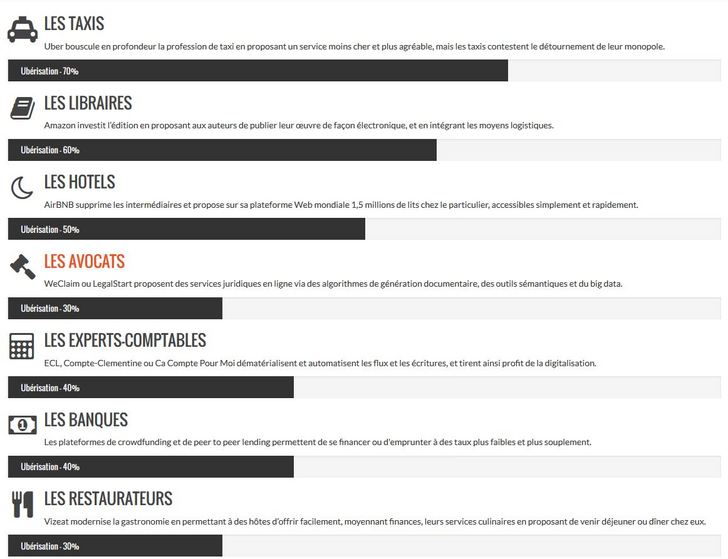Economic sectors affected by uberisation
Entered into the French dictionary in May 2016, uberization raises fears, fantasies and hopes behind the digital and social transformation it has engendered in many sectors of activity. Clipperton, a merchant bank, took an interest in a study that deserved a lot of attention.
It is at the center of the politico-economic debates. She is hated by supporters of social protection. It is dubbed by the singers of a flexibility of work that they consider immutable in the globalized competition. “She” is the uberisation. Galvaudé, recovered, misunderstood, the macroeconomic phenomenon has its paragons media, including the world giant of the VTC that gave it its name, Uber. With the success of P2P applications of a not-so-collaborative digital economy, any start-up wants to uberise its market. This is his appeal product.
The problem is that the uber-economy is an over-mediated concept still very vague in its precise definition, despite its entry in the dictionary in May 2016. The fields of its ramifications are broad and its consequences much wider than its only immediate service impact. To better understand what uberisation really is, what are its characteristics and its actors, the investment bank, Clipperton, specialized in new technologies, has released an interesting study. One month after its publication, Influencia looks back a little on the concrete meaning of a term “which is ultimately very French,” says one of the three authors of the study, Thibaut Revel, partner Clipperton.
“We can see three main characteristics in this economy: firstly, its impact on the organization of work, secondly, an aggressive conquest with means operating in large markets, and thirdly, a transaction that is always done on a platform. is for example the strength of Uber and generates the legal debate around the management of the transaction “, explains Thibaut Revel” There are also lesser and less known sectors that are now uberised, as the in -store marketing, with for example the application Bemyeye which in his case takes the budget of a marketing agency.You can also quote Click and Walk in the same register, but also Creads, the first online graphic design platform, or Hopwork, which has uberized the agency agency market “.
Regulate by letting the march advance, the challenge of the public authorities
What are the next sectors affected by the uberisation? Today, transport (Uber, Didi Chuxing, Drivy), housing (Airbnb, Tujia, Onefinestay), home services (Helpling, Taskrabbit) and micro-jobbing and free-lancing (Upwork, Gigwalk) are the the most explicit models of the collaborative and digital transformation of completely upset markets. In an economy where people are complaining about their purchasing power, the extra income from uberisation is valued. “All trades are not affected by the phenomenon, ensures Thibaut Revel” It will touch those where the relationship between the customer and the supplier is important. Those where the relationship of trust is bilateral will be spared. The failure of the home-based household market confirms it. “What about education?” Difficult to say, because it requires a relationship of deep understanding between two people, “says Thibaut Revel.
For the partner of Clipperton, who with this study for investors and the sector of new technologies wanted to “give a picture of what we see to bring to thinking”, there is an important reflection to lead from public authorities. It is they who have to balance the different types of actors and organize a healthier competition when the abuses are obvious. The key is to do it “by letting the market move forward and regulate itself,” says Thibaut Revel. For Denis Jacquet and Grégoire Leclercq, the two authors of the book “Uberization, an enemy who wants you good”: “the policies are totally lost and overwhelmed by the phenomenon, and the general public is wondering what is really happening”.
Cartographie des secteurs ubérisés


Taxis and bookstores are the most affected
The other challenge of the elected is obviously to fulfill their legislative duty by avoiding the pitfalls of easy political recoveries, made sales by the fact that the term even uberization is still poorly understood by the general public. He lends to amalgam. “We must still remember that the term of collaborative economy is often presented by its marketing in a positive light while it is still a project first profit for the majority of apps,” says Thibaut Revel . On its website, the fascinating Observatory of the uberisation publishes a useful cartography of the sectors of activity hit by the phenomenon.
With 70%, 60% and 50% respectively, taxis, bookstores and hotels are on the podium. Lawyers come fourth and banks sixth, while for six months the legal tech market is developing in France. Moreover, at the end of October, Influencias was interested in a French start-up that uses artificial intelligence, thus bots and algorithms, to develop a search engine.







